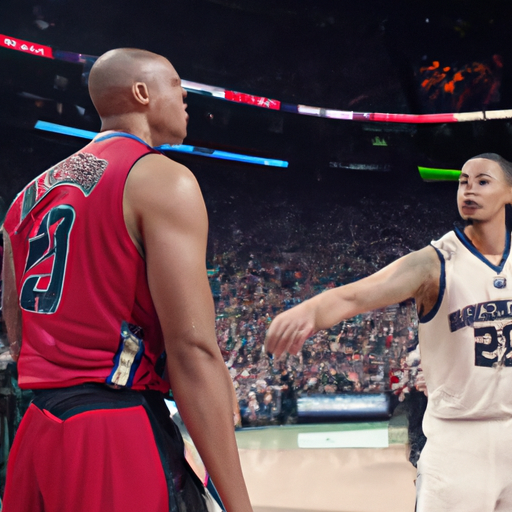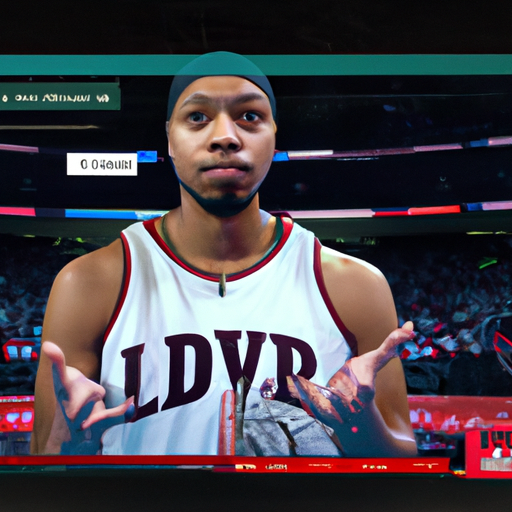Clyde Drexler’s son defends Damian Lillard amid trade request backlash

The Importance of Loyalty in Professional Sports
The world of professional sports is often characterized by fierce competition, high stakes, and a constant pursuit of success. In this cutthroat environment, loyalty can sometimes be seen as a rare and undervalued quality. However, recent events have brought the importance of loyalty in professional sports back into the spotlight. One such event involves Damian Lillard, the star point guard for the Portland Trail Blazers, and the backlash he has faced after requesting a trade.
Lillard, who has spent his entire career with the Trail Blazers, has been a loyal and dedicated player to the franchise. He has consistently shown his commitment to the team, both on and off the court. However, after years of falling short in the playoffs, Lillard expressed his desire to compete for a championship elsewhere. This decision has sparked a heated debate among fans and analysts, with many questioning his loyalty to the team that has supported him throughout his career.
Amidst this controversy, Clyde Drexler’s son, Adam Drexler, has come forward to defend Lillard’s trade request. Drexler, who himself grew up in the world of professional basketball, understands the pressures and challenges that players face. He argues that loyalty should not be a one-way street, and that players have the right to pursue their own goals and aspirations.
Drexler’s defense of Lillard highlights an important aspect of loyalty in professional sports – it is a complex and multifaceted concept. While loyalty to a team is often expected and celebrated, it is crucial to recognize that players also have their own dreams and ambitions. They dedicate their lives to their craft, sacrificing time with family and friends, and enduring physical and mental challenges. In return, they hope to achieve success and fulfill their potential.
Furthermore, loyalty in professional sports is not solely dependent on the player. Teams and organizations also have a responsibility to create an environment that fosters loyalty. This includes providing the necessary resources and support for players to succeed, as well as making strategic decisions that align with the team’s goals. When these conditions are not met, it is understandable that players may seek opportunities elsewhere.
It is also important to consider the broader context in which loyalty operates in professional sports. The landscape of the NBA, for example, has changed significantly in recent years. Super teams have become the norm, with star players joining forces to increase their chances of winning championships. In this highly competitive environment, loyalty to a single team can sometimes be seen as a hindrance to success.
However, it is crucial to strike a balance between individual aspirations and team loyalty. While players have the right to pursue their own goals, they should also consider the impact of their decisions on the team and its fans. Loyalty is a two-way street, and players should strive to find a middle ground that allows them to achieve their personal goals while also honoring their commitments to their team and its supporters.
In conclusion, the recent trade request by Damian Lillard has reignited the debate about loyalty in professional sports. While loyalty is an important quality, it is a complex and multifaceted concept that should be viewed in a broader context. Players have their own dreams and aspirations, and teams have a responsibility to create an environment that fosters loyalty. Striking a balance between individual goals and team loyalty is crucial for the success and harmony of both players and organizations.
Understanding the Dynamics of Trade Requests in the NBA

Understanding the Dynamics of Trade Requests in the NBA
In the world of professional sports, trade requests are not uncommon. Players often seek new opportunities or better situations for themselves, and it is not unusual for fans and media to scrutinize these decisions. Recently, Portland Trail Blazers’ star Damian Lillard made headlines when he expressed his desire for a trade. However, amidst the backlash, Clyde Drexler’s son, Adam Drexler, has come forward to defend Lillard’s decision.
Trade requests in the NBA are complex and multifaceted. They involve a delicate balance between a player’s personal aspirations and the team’s long-term goals. While fans may view trade requests as disloyal or selfish, it is essential to understand the underlying dynamics that drive these decisions.
One of the primary factors behind trade requests is a player’s desire for success and championships. NBA players are highly competitive individuals who strive to win at the highest level. Lillard, a talented point guard, has undoubtedly achieved individual success throughout his career. However, he has yet to win an NBA championship, and this desire for team success may be a driving force behind his trade request.
Another crucial aspect to consider is the team’s ability to build a competitive roster around its star player. Lillard has been the face of the Trail Blazers for years, but the team has struggled to assemble a championship-caliber supporting cast. Despite his exceptional performances, Lillard cannot single-handedly carry the team to a championship. By requesting a trade, he is signaling his desire for a team that can provide him with the necessary support to compete at the highest level.
Furthermore, trade requests can also be influenced by a player’s personal circumstances. Lillard, who is now in his early thirties, may be feeling the pressure of time running out on his prime years. He may want to maximize his chances of winning a championship while he is still at the peak of his abilities. This sense of urgency can be a significant factor in a player’s decision to request a trade.
While trade requests are often met with criticism, it is crucial to recognize that players have the right to make decisions that they believe are in their best interest. Adam Drexler, the son of NBA legend Clyde Drexler, understands this perspective and has come forward to defend Lillard’s trade request. Drexler acknowledges that players have limited control over their careers and should be allowed to explore opportunities that align with their goals.
Drexler’s defense of Lillard’s trade request highlights the importance of empathy and understanding in these situations. It is easy for fans and media to criticize players for seeking new opportunities, but it is essential to remember that these decisions are not made lightly. Players invest countless hours of hard work and dedication into their craft, and they deserve the chance to pursue their dreams.
In conclusion, trade requests in the NBA are a complex matter that involves various factors. Players like Damian Lillard seek new opportunities and better situations for themselves, driven by their desire for success, the team’s ability to build a competitive roster, and personal circumstances. While trade requests may face backlash, it is crucial to approach these situations with empathy and understanding. Adam Drexler’s defense of Lillard’s trade request serves as a reminder that players have the right to make decisions that they believe are in their best interest. Ultimately, it is essential to respect and support players as they navigate their careers in pursuit of their goals.
Examining the Role of Player Support in Trade Request Backlash
Clyde Drexler’s son, Adam Drexler, has come to the defense of Portland Trail Blazers star Damian Lillard amid the backlash he has faced following his trade request. This incident has sparked a broader discussion about the role of player support in trade request backlash.
Trade requests are not uncommon in professional sports, as players often seek new opportunities or better situations for themselves. However, when a player of Lillard’s caliber expresses his desire to leave a team, it can create a significant stir among fans and media alike. In this case, the backlash has been particularly intense, with some questioning Lillard’s loyalty and commitment to the Trail Blazers.
Adam Drexler, who himself played college basketball and understands the pressures and challenges faced by professional athletes, took to social media to defend Lillard. He argued that fans should respect Lillard’s decision and understand that players have the right to pursue their own happiness and career goals. Drexler emphasized that loyalty should not be a one-way street, and that players deserve the same level of support and understanding that fans expect from them.
Drexler’s defense of Lillard raises an important point about the role of player support in trade request backlash. When a player expresses a desire to leave a team, it is often met with disappointment and frustration from fans who have invested their time, money, and emotions into supporting that player. However, it is crucial to remember that athletes are human beings with their own aspirations and dreams.
In recent years, there has been a shift in the way fans and media perceive trade requests. While they were once seen as acts of disloyalty, they are now more commonly understood as a player’s attempt to take control of their own career. This change in perception is largely due to the increased empowerment of athletes and the recognition that they have the right to make decisions that are in their best interest.
However, despite this shift, trade request backlash still exists. Fans often feel betrayed and let down by players who want to leave their favorite teams. This backlash can be particularly harsh when it comes to star players like Lillard, who have become the face of their franchise and have a deep connection with the community.
It is important to recognize that trade request backlash can have a significant impact on players’ mental health and well-being. The constant scrutiny and criticism can take a toll on their performance on the court and their overall happiness. This is why it is crucial for players to have a support system in place, both within their team and from their fellow athletes.
In defending Lillard, Adam Drexler highlights the importance of player support in trade request backlash. When players receive support from their peers, it can help them navigate the difficult emotions and challenges that come with trade requests. It can also send a powerful message to fans and media that players deserve understanding and empathy.
In conclusion, the defense of Damian Lillard by Clyde Drexler’s son, Adam Drexler, sheds light on the role of player support in trade request backlash. While trade requests are a common occurrence in professional sports, they often face backlash from fans and media. However, it is crucial to remember that athletes have the right to pursue their own happiness and career goals. Player support can play a vital role in helping athletes navigate the challenges and emotions that come with trade requests, and it sends a powerful message that players deserve understanding and empathy from fans and media.

